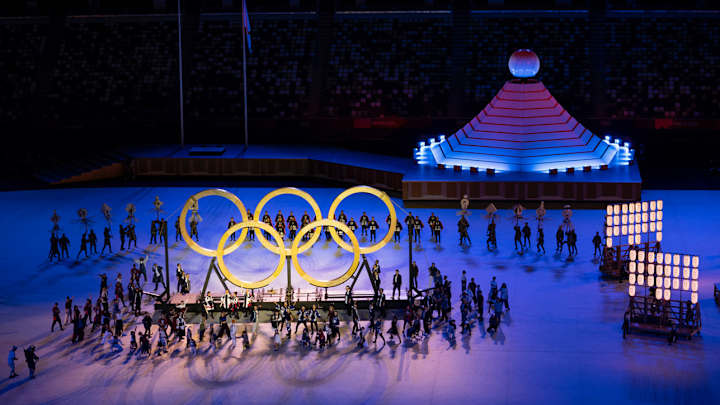Pandemic, Protests Loom Over Lackluster Opening Ceremony at Tokyo Olympics

Sign up for our free daily Olympics newsletter: Very Olympic Today. You'll catch up on the top stories, smaller events, things you may have missed while you were sleeping and links to the best writing from SI’s reporters on the ground in Tokyo.
TOKYO — The anthem singing was lovely, the show was spectacular, and yet the Opening Ceremony of Tokyo “2020” still felt out of step with reality. Inside the Olympic Stadium, there was so little energy that when the video screen declared 25 seconds to go, almost nobody seemed to notice. With no fans allowed in the building, it was possible to hear the hundreds of protestors shouting on the streets outside throughout the show, because they don’t want the Olympics here, and whether you agree with them is beside the point. You cannot respectfully celebrate a country that resents you for doing so.
The logo for these Olympics should be one hand clapping. The fireworks from the stadium roof almost seemed like an act of aggression. Athletes marched in and waved to empty seats. Who was anybody kidding? Absent context, this was a gorgeous evening, but context does matter. The Opening Ceremony shows us how a country (or its government) wants to be seen. Polls show that right now, most Japanese people don’t want this event.
The Tokyo 2020 Organizing Committee put on a beautiful but doomed show. There was a moment of silence for those who have died of COVID-19, and a stationary bike and a treadmill to represent athletes training in isolation. Seeing baseball legend Sadaharu Oh hold the Olympic flame and then Naomi Osaka carry it a few minutes later was a reminder of just how far-reaching the Olympics are. But the pageantry of the Olympics doesn’t feel the same this year. The fun will have to come from the games—lowercase g.
Just hold a bunch of sporting contests already. Give us Simone Biles leaping over the competition—literally if possible, please—and swimmers setting world records and thousands of athletes doing what even they were not sure was possible. The athletic performances should still be special. They will probably also be the only normal aspect of the Olympics.
At least, let’s hope the events go off as planned. There should be real concerns that a COVID-19 outbreak will wreck these Olympics. Predicting the future is folly, especially these days, when we can’t even agree on what already happened, let alone what will happen. The word wreck is subjective, too. The reality for U.S. audiences is that if COVID-19 knocks out all the handball teams, it won’t wreck anything, because Americans do not care about handball. (This is a flaw in our national character. Handball is awesome.) If the virus boots Biles, Caeleb Dressel and Katie Ledecky, that’s a problem, and not just for NBC.
The Olympics are both massive and compressed, with more than 11,000 athletes competing in a short period of time. That means a lot of potential coronavirus exposure and no real opportunity to reschedule anything. Athletes who test positive will not be allowed to compete.
The U.S. Olympic Committee announced Friday that 83% of its athletes have been vaccinated, which beats the national average, but that means roughly 100 American athletes here are not vaccinated—and it’s reasonable to assume that with widespread access to vaccines and medical care, the U.S. athlete vaccination rate is higher than that of most countries.
Young, healthy, vaccinated people like Biles are highly unlikely to be hospitalized with COVID-19. But they can still test positive and see years of work go to waste. There is no consolation in saying, ”Sure, I missed out on a gold medal, but I had no symptoms.”
There will be positive tests. There have been some already. The questions are how many and how high-profile they are. The U.S. delegation that walked into the opening ceremony was smaller than at most Summer Games. Organizers and most U.S. athletes understand how precarious the situation is.
COVID-19 is intertwined with these Olympics. That’s not a negative view. It’s just an honest one. There will be no fans, no juice, no sense that Japan is on display for the world. The track competition might feel disturbingly like the NFL combine.
The protestors outside the Olympic Stadium are intertwined with the Olympics, too. This isn’t like when sportswriters questioned whether universities should stage football games. The host country’s population is part of the Olympics. Most sports fans don’t remember where specific Super Bowls were played, but say “Lillehammer” or “Sydney” to people who love the Olympics, and they can immediately summon a year and a box of memories.
Outside the stadium Friday, people chanted. Inside, we heard:
Ladies and gentlemen, please stand for his majesty …
Most of the people sitting in the stadium were journalists—who are not, as a matter of professional protocol, supposed to stand for any majesty. The request felt like an outdated line that somebody forgot to delete. The whole opening ceremony felt that way. The emperor had no audience.
More Olympics Coverage:
• The Games Go On—With a New Purpose
• Meet Team USA Athletes Competing in Tokyo
• Katie Ledecky Is Hungry For Even More in Tokyo

Michael Rosenberg is a senior writer for Sports Illustrated, covering any and all sports. He writes columns, profiles and investigative stories and has covered almost every major sporting event. He joined SI in 2012 after working at the Detroit Free Press for 13 years, eight of them as a columnist. Rosenberg is the author of "War As They Knew It: Woody Hayes, Bo Schembechler and America in a Time of Unrest." Several of his stories also have been published in collections of the year's best sportswriting. He is married with three children.
Follow rosenberg_mike